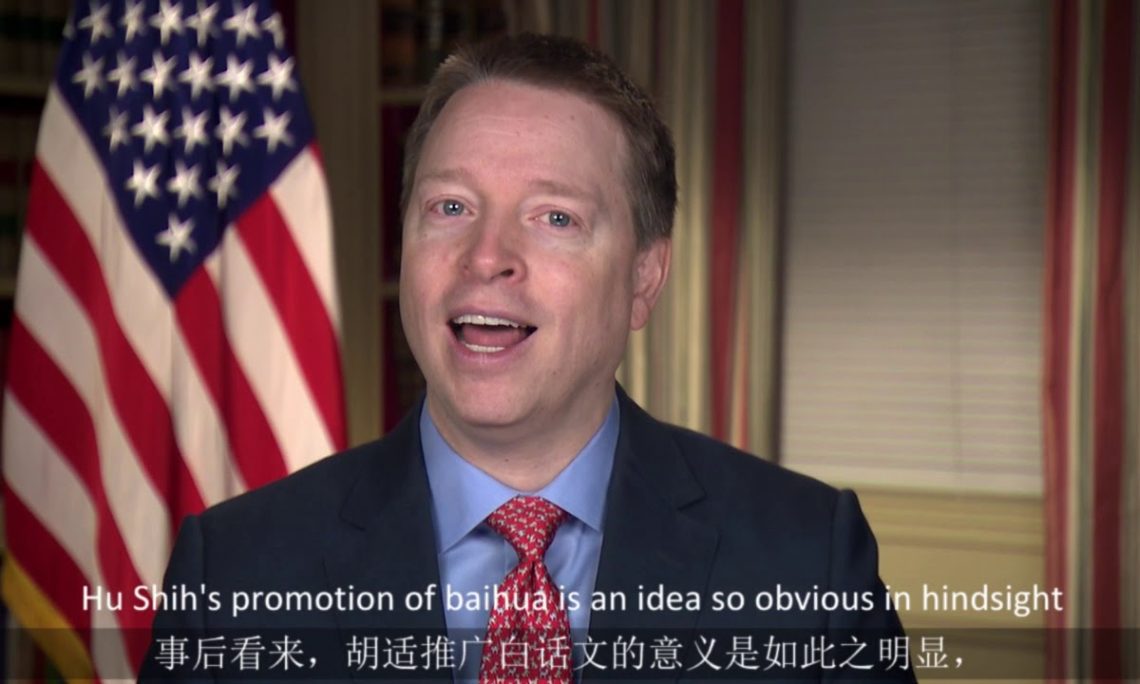Trump's deputy national security advisor Matthew Pottinger spoke in fluent Mandarin on Monday, May 4, 2020, delivering a speech to the Chinese people in a rare and provocative address.
The date marked the 101st anniversary of the May Fourth Movement in China, which grew out of student protests, and was instrumental to the success of China's Communist Revolution.
Pottinger's address stands out in the series of recent exchanges over the Covid-19 pandemic that contribute further to deteriorating relations between the United States and China.
By speaking to the Chinese people directly, the U.S. appears to challenge the Chinese Communist Party's (CCP) grip on power.
 Photo via White House
Photo via White House
U.S. official encourages Chinese to rise up against govt in speech
In his e-address, Pottinger championed democracy for China by bringing up the May Fourth Spirit, referring to China's nationalist movement in 1919 that led to the country's Communist Revolution.
Pottinger previously spent seven years working for Reuters and Wall Street Journal as a journalist in China between 1998 to 2005.
His experience -- he faced intimidation while covering the country -- was said to have shaped the Trump administration's hardline stance towards China.
Drawing on the movement, he argued that China does best when it listens to the diverse opinions of its citizens.
The speech was not meant to be prescriptive, he said, and added that the country's future ultimately lies with its people.
His remarks echo an approach in China that uses history to criticise leaders in a subtle way, instead of coming at them directly.
China could benefit from "a little more populism, a little less nationalism”
Pottinger also warned that Beijing's efforts to suppress internal criticism were doomed to backfire.
He highlighted Li Wenliang, a doctor who sent a message in his medical school alumni WeChat group back in December 2019 to warn about the Covid-19 outbreak.
Li was called in by the local police and reprimanded for spreading rumors online and disrupting social order.
He later died from the virus on Feb. 7, 2020.
Pottinger referred to Li as one of the "heirs" of the May Fourth Spirit, together with a number of citizen journalists in China, namely Chen Qiushi, Fang Bin, and Li Zehua, who have been critical of the Chinese government's handling of the Covid-19 outbreak.
"When small acts of bravery are stamped out by governments, big acts of bravery follow," Pottinger said.
He remarked that China could benefit from "a little more populism, a little less nationalism”, adding that democratic populism was about "reminding a few that they need the consent of many to govern".
"When a privileged few grow too remote and self-interested, populism is what pulls them back or pitches them overboard," he said.
Declining US-China relations
In the early months of 2020, U.S.-China relations worsened due to several spats over the Covid-19 outbreak.
U.S. President Donald Trump accused China of failing to alert the world to the Covid-19 threat soon enough, and in a transparent manner.
Trump also stood out for fuelling a conspiracy theory that the Covid-19 pathogen had been accidentally leaked from a virology lab in Wuhan.
The theory was vehemently denied by the lab itself, and was also rejected by virus experts from outside of China.
Up until late March, Trump had been referring to Covid-19 as the "Chinese virus", refuting claims and criticism that the phrase was racist.
In April, Trump also halted U.S. funding to the World Health Organisation (WHO), accusing the WHO of failing to do its job to get medical experts to objectively assess the situation and call out China's lack of transparency.
China's ambassador to the U.S., Cui Tiankai, defended China's handling of the viral outbreak, saying China had been open in providing information to the U.S. and the World Health Organisation through calls made in January, as well as daily press briefings, Reuters reported.
He also criticised the U.S. for giving "little attention" to the views of scientists as "some politicians are so preoccupied in their efforts for stigmatisation, for groundless accusations".
The worsening bilateral relations are layered upon tensions from an ongoing trade war between the two countries since 2018.
Watch Pottinger's speech in full here:
Top image by Fred Dufour/AFP via Getty images
If you like what you read, follow us on Facebook, Instagram, Twitter and Telegram to get the latest updates.
